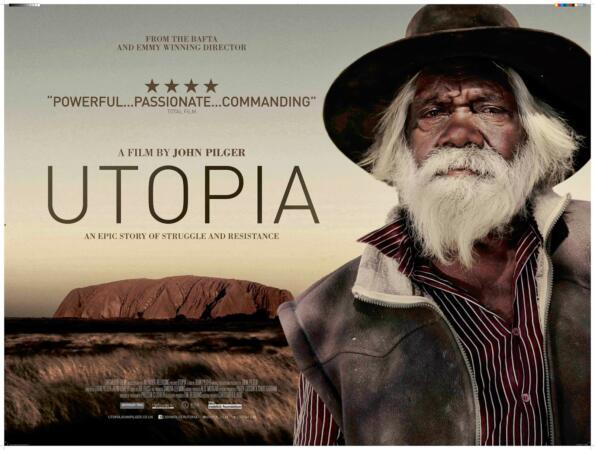
Icarus Films is releasing veteran journalist and BAFTA-award-winning filmmaker, John Pilger’s feature documentary “Utopia” – a film that reveals the apartheid deep within Australia’s society.
“Utopia” breaks what amounts to a national silence about Australia’s indigenous people—the oldest and most enduring human presence on Earth. Aboriginal people are still living in abject poverty and developing-world conditions, with a low life expectancy and disproportionately high rate of deaths in police custody. “Utopia” explores Australia’s suppressed colonial past and rapacious present.
The title comes from the Aboriginal homeland community of Utopia, Northern Territory, one of the poorest and most desolate areas in Australia.
In the film, Pilger chronicles his journey to Utopia to observe the changes that occurred in Aboriginal Australia between 1985 and 2013. After almost three decades, Pilger discovers that Aboriginal families are still living in extremely overcrowded and poorly sanitized asbestos shacks, and are plagued by easily curable diseases. The Secretary General of Amnesty International, Salil Shetty, who happens to be in Utopia at the same time as Pilger, ponders why one of the world’s richest countries cannot solve the problem of Aboriginal poverty, and states that the inequity and injustice could be fixed if the will to do so existed.
The film goes on to explore some of the issues currently afflicting Australia such as: failed health policies, Aboriginal deaths in police custody, mining companies failing to share the wealth they have acquired with the first Australians and the disputed allegations made by the media and government that there were pedophile rings, petrol warlords and sex slaves in Aboriginal communities and the resulting 2007 intervention.
The film also features a visit to Rottnest Island, Western Australia, where an area that was used as a prison for Aboriginal people until 1931, has now been converted into a luxury hotel where tourists are not even informed of the island’s brutal history.
“Utopia” highlights that Aboriginal Australians in Australia are currently imprisoned at 10 times the rate that South Africa imprisoned black people under apartheid, rates of rheumatic heart disease and trachoma among Aboriginal Australians are some of the highest in the world and suicide rates are increasing, especially among youths.
Pilger informs viewers that unlike the US, Canada and New Zealand, no treaty was ever negotiated between the indigenous peoples of Australia and the colonists, and that the abandonment of the mining tax in 2010 lost an estimated $60 billion in revenue, which he argues was more than enough to fund land rights and to end all Aboriginal poverty.
In terms of the film’s impact, in Western Australia, the Police Minister was sent to a screening of “Utopia” by the state government, and the State Premier held discussions with Aboriginal leaders on some of the issues highlighted in the film. In the Northern Territory, government representatives were advised to defend the existing policies against any concerns raised by the community due to the film.
Director John Pilger, when discussing the impact and relevance of “Utopia” stated: “That Australian governments believe they can manipulate and discriminate against Aboriginal communities in a manner that has been described in the UN as ‘permissively racist’ is astonishing in the 21st century. How ironic that as Nelson Mandela was buried and venerated, another form of the system he fought against was alive and well in Australia.”
In addition, Pilger has said that “Utopia” was filmed for both Australian and international audiences. He believes that most Australians are still mostly unaware of their Indigenous history and culture.
Icarus Films is releasing “Utopia,” which is now available for digital purchase and rental on SVOD platforms including Amazon, iTunes, Google Play and Vudu.
Watch a trailer below:
